 W
WIsabella Teotochi Albrizzi was a Greek - Venetian writer, salonist and countess.
 W
WAlexander was King of Greece from 11 June 1917 until his death three years later, at the age of 27, from the effects of a monkey bite.
 W
WZacharias Pantelakos, nicknamed Barbitsiotis but more commonly known as kapetan Zacharias was a Greek klepht in the Peloponnese during the last decades of Ottoman rule over Greece. He is described by Kyriakos Kassis as the best thief of Taygetus.
 W
WBaron Konstantinos Bellios or Vellios was a Greek merchant and benefactor from the Ottoman Empire, the modern region of Greek Macedonia.
 W
WKaterina "Rosa" Botsari was a member of the Souliot Botsaris family. The daughter of Markos Botsaris, she was in the service of Queen Amalia of Greece as well as an admired young woman throughout the European courts - she was immortalised for the 'Gallery of Beauties' of Ludwig I of Bavaria in an 1841 painting by Joseph Stieler. A Damask rose species bred in 1856 was named Rosa Botsaris after her. In 1845 she married prince and general George Karatzas.
 W
WKote Hristov, known simply as Kote or Kottas, was a Slavophone insurgent leader in Western Macedonia.
 W
WCyril II of Jerusalem was born in 1792 in the island of Samos. In 1816 he was ordained a deacon, then a presbyter, was abbot of the monastery. In 1835 he became Archbishop of Sebasteia and in 1838 of Lydia. In 1845 he was elected as the Greek Orthodox Patriarch of Jerusalem under the name Cyril II (1846–1872) by the Hagiotaphites and remains to 1872. On 28 February 1870, Sultan Abdülaziz I signed a firman which created the Bulgarian Exarchate subjectеd to the Ecumenical Patriarchate but yet as a representative of the Bulgarian millet in the Ottoman Empire. Cyril II participated in the Council in Constantinople, chaired by Ecumenical Patriarch Anthimus VI, in September 1872, wherein the Patriarchs of Alexandria and Antioch also participated and which on 18/30 September declared the Bulgarian Exarchate as schismatic and its adherents excommunicated. Cyril opposed the declaration of schism and declined to sign the Council's decisions. On September 14, 1872 Cyril II left the council in Constantinople by steamer to Jaffa and Jerusalem. Dethroned from the patriarchal throne on 12 December 1872, in his absence. Cyril II had many supporters - especially among Christian Arabs, but also among high-ranking dignitaries, many of whom suffer because of it. Cyril's successor on the patriarchal throne, Procopius, remained little more than two years. On 26 February 1875, mainly under the pressure of the Arab population and Orthodox clergy, he was deposed. Arab notables from Jerusalem wanted former patriarch Cyril II to be a candidate for the vacant throne, but in a pastoral message, published in the newspapers, he declined this invitation on grounds of advanced age. He died on 18 August 1877.
 W
WCyril VII was Ecumenical Patriarch of Constantinople from 1855 to 1860.
 W
WHatzimichalis Dalianis was a commander of the Greek War of Independence (1821–1830) and revolutionary leader in Crete in 1828.
 W
WKonstantinos Demertzis was a Greek politician. He was the 49th Prime Minister of Greece from November 1935 to April 1936. Demertzis died during his mandate, of a heart attack, on April 13, 1936.
 W
WEvangelinos Apostolides Sophocles was a Greek Orthodox monk, professor of classics and Modern Greek at Harvard University, and lexicographer. He was born in Tsangarada, Thessaly, Ottoman Empire, and he died in Cambridge, Massachusetts. He was a fellow of the American Academy of Arts and Sciences and is considered to be a pioneer of Modern Greek studies.
 W
WTevfik Fikret was the pseudonym of Mehmed Tevfik, an Ottoman educator and poet, who is considered the founder of the modern school of Turkish poetry.
 W
WPanagiotis Gargalidis was a Greek army general who fought in the Greco-Turkish War of 1897, the Balkan Wars, World War I, and the Asia Minor Campaign, and leader of a failed coup attempt in 1923.
 W
WGeorge II ; was King of Greece from September 1922 to March 1924 and from November 1935 to his death in April 1947.
 W
WKonstantinos Giannias was a Greek klepht who operated in the Peloponnese. Giannias was born in Prostovitsa, a village now known as Drosia in Achaia. He was the brother of Giannis Giannias.
 W
WGeorgios Nicolaou Hatzidakis was a Greek philologist, who is regarded as the father of linguistics in Greece. He was the first chair of Linguistics and Indian Philology at the University of Athens in 1890–1923.
 W
WPavlos Kalligas was a Greek jurist, writer and politician, who served as professor at the University of Athens, Member and Speaker of the Hellenic Parliament, cabinet minister for Foreign Affairs, Education, Finance and Justice and chairman of the National Bank of Greece.
 W
WMarianna Sotirianos Kambouroglou (1819-1890), was a Greek folklorist.
 W
WXenophon Emmanuel Kasdaglis, or Xenophon Casdagli, was an Egyptiote Greek – later on British citizen – tennis player. He competed in the 1906 Intercalated Games in Athens.
 W
WNikolaos Kasomoulis was a participant in the Greek Revolution of 1821, and one of the main historical sources about it.
 W
WPanagiotis Kefalas was a Greek fighter of the Greek Revolution of 1821.
 W
WGeorgios Kondylis was a general of the Greek army and Prime Minister of Greece. He was nicknamed Keravnos, Greek for "Thunder" or "Thunderbolt".
 W
WStefanos Koumanoudis was a Greek archaeologist, teacher and writer of the 19th century.
 W
WArmen Kouptsios was a Greek Macedonian revolutionist.
 W
WGeorgios Leonardopoulos was a Greek army major general who fought in the Greco-Turkish War of 1897, the Balkan Wars, World War I, and the Greco-Turkish War of 1919–1922, and leader of a failed coup attempt in 1923.
 W
WSpiridion Lusi was a Greek scholar, diplomat, politician and naturalized ambassador of Prussia.
 W
WAlexandros Lykourgos was a Greek theologian, Greek Orthodox cleric and university professor.
 W
WAspasia Manos was a Greek aristocrat who became the wife of Alexander I, King of Greece. Due to the controversy over her marriage, she was styled Madame Manos instead of Queen Aspasia, until recognized as HRH Princess Aspasia of Greece and Denmark after Alexander's death and the restoration of King Constantine I, on 10 September 1922.
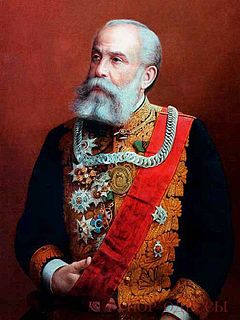 W
WGrigorios Maraslis was an official of the Russian Empire and long-time mayor of Odessa (1878–1895) of Greek origin. A noted philanthropist, he sponsored many buildings and educational institutions both in Odessa and in various cities in Greece and for the Greek communities of the Ottoman Empire. He was awarded Order of the Cross of Takovo and Order of Prince Danilo I.
 W
WIoannis Metaxas was a Greek military officer and politician, serving as Prime Minister of Greece from 1936 until his death in 1941. He governed constitutionally for the first four months of his tenure, and thereafter as the strongman of the 4th of August Regime.
 W
WZachos Milios was a Greek revolutionary of the Greek War of Independence (1821–1830) and officer of the Greek army. He was the brother of the distinguished general and politician Spyros Milios.
 W
WAndreas Moustoxydis, sometimes Latinized as Mustoxydes or in the Italian form Andrea Mustoxidi, was a Greek historian and philologist from Corfu.
 W
WEvangelos Natsis Georgiou was a Slavophone Greek revolutionary leader born 1876 in Srempeno (Σρέμπενο) or Srebreno (Сребрено), Salonica Vilayet, Ottoman Empire ; died May 12, 1904. He is also known as Strempeniotis or Capetan Vangelis. In 1897, he volunteered for military service in the Greco-Turkish War (1897). In 1904, he was one of the first who began the Macedonian Struggle. He co-operated with Germanos Karavangelis, who brought him in contact with volunteers who had just arrived from Crete. He organized his own troop and inflicted many losses on the Internal Macedonian Revolutionary Organization (IMRO), most importantly the extermination of Voivod Kirchev.
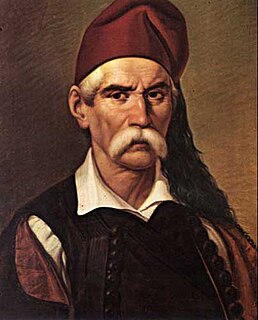 W
WNikitaras was the nom de guerre of Nikitas Stamatelopoulos, a Greek revolutionary in the Greek War of Independence. Due to his fighting prowess, he was known as Tourkofagos, literally meaning the "Turk-Eater".
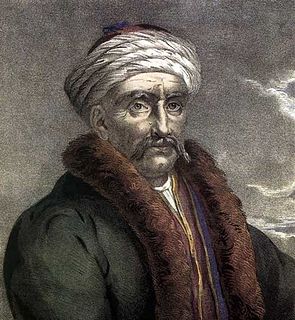 W
WPanoutsos Notaras was a leading figure of the Greek War of Independence, serving several times as president of the Greek national assemblies and legislative bodies.
 W
WOlga Constantinovna of Russia was Queen of the Hellenes as the wife of King George I. She was briefly the regent of Greece in 1920.
 W
WIoannis Papafis was a merchant and entrepreneur from Thessaloniki and is considered a national benefactor of Greece.
 W
WAlexandros Papanastasiou was a Greek lawyer, sociologist and politician who served twice as the Prime Minister of Greece in the interwar period, being a pioneer in the establishment of the Second Hellenic Republic.
 W
WKallirhoe Parren launched the feminist movement in Greece and was a journalist and writer in the late 19th and early 20th century.
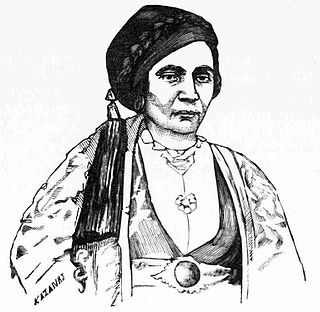 W
WPhotini Kolokotroni–Tzavela served as Lady-in-Waiting at the royal court of King Otto. She was the daughter of the chieftain Photos Tzavelas, sister of Kitsos Tzavelas, prime minister of Greece, wife of Ioannis (Gennaios) Kolokotronis, also prime minister and mother of the journalist Theodoros Kolokotronis.
 W
WSophie Lebrun, Duchess of Plaisance (1785–1854) was born in Philadelphia, Pennsylvania, where her father, François Barbé-Marbois, was serving as French Consul-General in the United States.
 W
WAnastasios Polyzoidis was a Greek politician and judicial official.
 W
WGeorge Rhaedestenos II was acting Lambadarios of the Ecumenical Patriarchate of Constantinople, when Stephen the Lambadarios was old and weak. He was an unimmitable performer of psaltic art, and second to none of his contemporary cantors; he was especially renowned for his ancient-like patriarchal chanting style.
 W
WDespina Achladiotou, known as the Lady of Ro, was a Greek patriot born on the island of Kastellórizo in 1890.
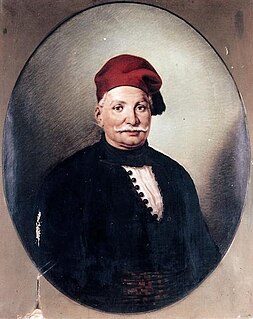 W
WGeorgios Sachtouris was a Hydriot ship captain and a leading admiral of the Greek War of Independence.
 W
WKonstantinos Sapountzakis was a Greek Army officer. He is notable as the first head of the Hellenic Army General Staff and as the first commander of the Army of Epirus during the First Balkan War.
 W
WSophia of Prussia was Queen consort of the Hellenes during 1913–1917 and 1920–1922.
 W
WSpyromilios or Spyros Milios, was a Greek revolutionary, general and politician.
 W
WGiannis Stathas was a Greek armatolos during the pre-Greek Revolution era in Greece. He later became leader of a small fleet in the Aegean Sea.
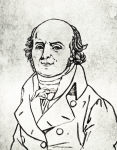 W
WDemetrio Stefanopoli was a Corsican notable and military officer in French service. A member of the Greek community of Corsica, in 1782 he received letters patent from Louis XVI recognizing him as the descendant and heir of David Komnenos, the last Emperor of Trebizond, after which he was known in French as Démétrius Stephanopoli Comnène.
 W
WSimone Stratigo was an Italian Greek mathematician and a nautical science expert who studied and lived in Padua and Pavia in 18th-century Italy.
 W
WAvra Theodoropoulou was a Greek music teacher, pianist, suffragist and women's rights activist. She founded the League for Women's Rights in 1920 and served as its chairperson from 1920 to 1957. She was married to the poet Agis Theros.
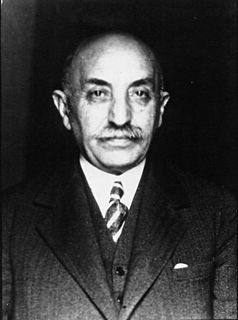 W
WPanagis Tsaldaris was a Greek politician and the 48th Prime Minister of Greece. He was a revered conservative politician and leader for many years (1922–1936) of the conservative People's Party in the period before World War II. He was the husband of Lina Tsaldari, a Greek suffragist, member of Parliament, and the Minister for Social Welfare.
 W
WAristotelis Valaoritis was a Greek poet, representative of the Heptanese School, and politician. He was also the great-grandfather of Nanos Valaoritis, one of the most distinguished writers of Greece.
 W
WVassiliki Kontaxi, nicknamed Kyra Vassiliki, was an influential Greek woman brought up in the seraglio of the Ottoman ruler Ali Pasha.
 W
WAdelphoi Zangaki were two brothers of Greek origin, who were active as photographers in Egypt and Algeria, from the 1860s through to the 1890s and who specialized in photographing ancient monuments and scenes of everyday life, producing prints for the tourist trade. They occasionally worked with the Port Said photographer, Hippolyte Arnoux on the project document works on the Suez Canal. They were amongst the first commercial photographers to produce large scale images of Egypt.
 W
WGeorgios Y. Zariphis, also known as Yorgo Zarifi, was a prominent Ottoman Greek banker and financier. He was also very well known as a prominent benefactor of his time. Zariphis met Sultan Abdul Hamid II when the latter was a shahzade with a low expectation of ascending to the throne. The prince, having financial troubles, called on the expertise of Zariphis to manage his personal wealth. After Abdul Hamid II became sultan, he continued to utilize Zarifi's advisory services.